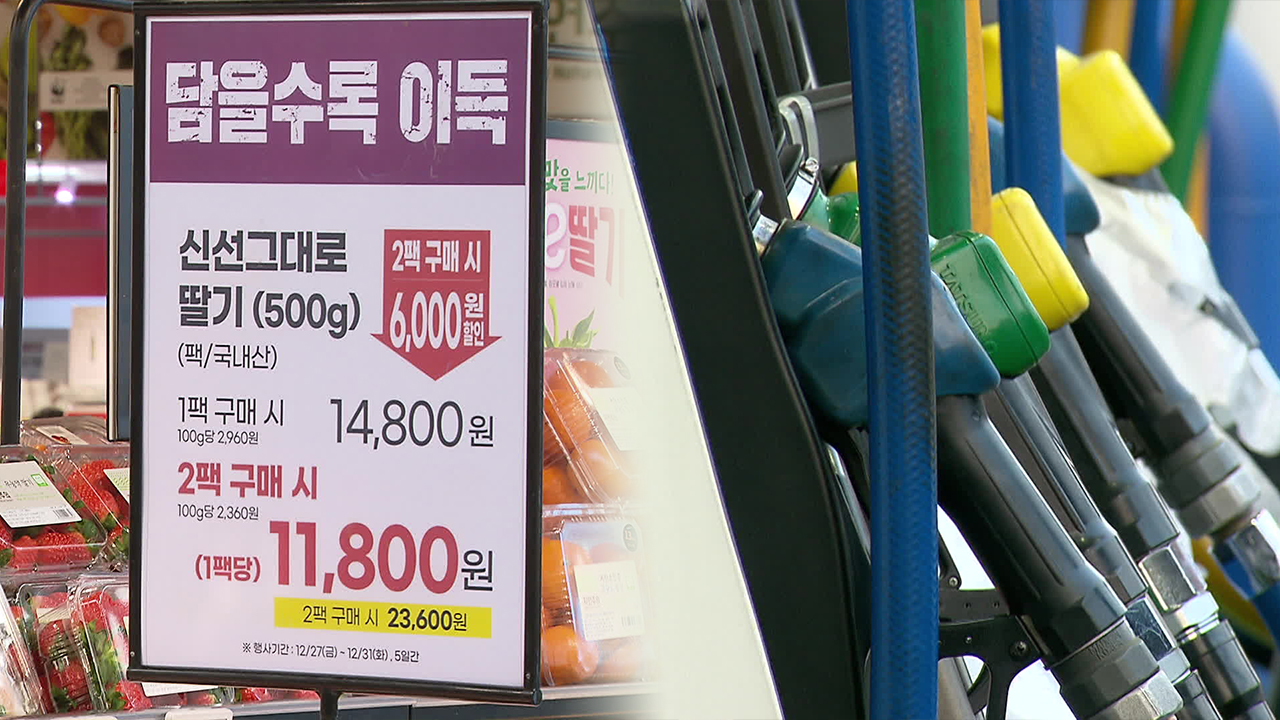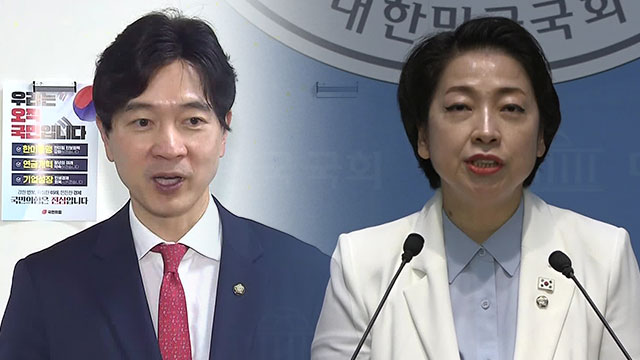Rising prices and exchange rates raise concerns for 2025
입력 2025.01.01 (04:44)
읽어주기 기능은 크롬기반의
브라우저에서만 사용하실 수 있습니다.
[Anchor]
Many people have found grocery shopping quite difficult this year.
With the prices of agricultural products rising significantly, consumer prices have inevitably felt high.
Recently, concerns are growing that prices may rise even more in the new year due to high exchange rates.
This is Jo Eun-ae reporting.
[Report]
Tangerines are the representative winter fruit.
Prices have risen by more than 50% compared to the average year.
The unusually long heat this year has continued to affect the winter season.
Strawberries have also been over 10,000 won for a 500-gram pack for quite some time.
[Lee Soo-mi/Seodaemun-gu, Seoul: "I was a bit surprised. The price for one is really high, so I was debating whether to buy one or two on sale."]
This year, fruit prices were so high that the term 'golden apple' was coined.
In the summer, the prices of vegetables like cabbage and spinach soared due to the heatwave.
While the overall contribution to inflation was low, the rise in prices of frequently purchased agricultural products significantly increased the burden felt by consumers.
In fact, the consumer price inflation rate for this year was recorded at 2.3%, the lowest since the COVID-19 pandemic, but agricultural product prices rose by 10.4%.
This is the highest increase in 14 years.
[Chae Kyung-soo/Anyang, Gyeonggi-do: "I think cabbage prices have risen the most, so I had a lot of difficulties preparing for kimjang this time."]
Looking at monthly prices, the increase is becoming larger as the exchange rate rises.
This is why the government believes that consumer prices may rise further in January next year.
With the Lunar New Year approaching, there is a time lag in reflecting the increases in exchange rates and oil prices.
[Jung Kyu-cheol/KDI Economic Outlook Director: "We are a bit more concerned about the domestic economy. I think it is important to manage the current domestic situation so that uncertainty does not prolong."]
The government has announced that it will extend the fuel tax reduction measures until the end of February next year and continue to lower tariffs on major food and feed raw materials.
This is KBS News Jo Eun-ae.
Many people have found grocery shopping quite difficult this year.
With the prices of agricultural products rising significantly, consumer prices have inevitably felt high.
Recently, concerns are growing that prices may rise even more in the new year due to high exchange rates.
This is Jo Eun-ae reporting.
[Report]
Tangerines are the representative winter fruit.
Prices have risen by more than 50% compared to the average year.
The unusually long heat this year has continued to affect the winter season.
Strawberries have also been over 10,000 won for a 500-gram pack for quite some time.
[Lee Soo-mi/Seodaemun-gu, Seoul: "I was a bit surprised. The price for one is really high, so I was debating whether to buy one or two on sale."]
This year, fruit prices were so high that the term 'golden apple' was coined.
In the summer, the prices of vegetables like cabbage and spinach soared due to the heatwave.
While the overall contribution to inflation was low, the rise in prices of frequently purchased agricultural products significantly increased the burden felt by consumers.
In fact, the consumer price inflation rate for this year was recorded at 2.3%, the lowest since the COVID-19 pandemic, but agricultural product prices rose by 10.4%.
This is the highest increase in 14 years.
[Chae Kyung-soo/Anyang, Gyeonggi-do: "I think cabbage prices have risen the most, so I had a lot of difficulties preparing for kimjang this time."]
Looking at monthly prices, the increase is becoming larger as the exchange rate rises.
This is why the government believes that consumer prices may rise further in January next year.
With the Lunar New Year approaching, there is a time lag in reflecting the increases in exchange rates and oil prices.
[Jung Kyu-cheol/KDI Economic Outlook Director: "We are a bit more concerned about the domestic economy. I think it is important to manage the current domestic situation so that uncertainty does not prolong."]
The government has announced that it will extend the fuel tax reduction measures until the end of February next year and continue to lower tariffs on major food and feed raw materials.
This is KBS News Jo Eun-ae.
■ 제보하기
▷ 카카오톡 : 'KBS제보' 검색, 채널 추가
▷ 전화 : 02-781-1234, 4444
▷ 이메일 : kbs1234@kbs.co.kr
▷ 유튜브, 네이버, 카카오에서도 KBS뉴스를 구독해주세요!
- Rising prices and exchange rates raise concerns for 2025
-
- 입력 2025-01-01 04:44:41

[Anchor]
Many people have found grocery shopping quite difficult this year.
With the prices of agricultural products rising significantly, consumer prices have inevitably felt high.
Recently, concerns are growing that prices may rise even more in the new year due to high exchange rates.
This is Jo Eun-ae reporting.
[Report]
Tangerines are the representative winter fruit.
Prices have risen by more than 50% compared to the average year.
The unusually long heat this year has continued to affect the winter season.
Strawberries have also been over 10,000 won for a 500-gram pack for quite some time.
[Lee Soo-mi/Seodaemun-gu, Seoul: "I was a bit surprised. The price for one is really high, so I was debating whether to buy one or two on sale."]
This year, fruit prices were so high that the term 'golden apple' was coined.
In the summer, the prices of vegetables like cabbage and spinach soared due to the heatwave.
While the overall contribution to inflation was low, the rise in prices of frequently purchased agricultural products significantly increased the burden felt by consumers.
In fact, the consumer price inflation rate for this year was recorded at 2.3%, the lowest since the COVID-19 pandemic, but agricultural product prices rose by 10.4%.
This is the highest increase in 14 years.
[Chae Kyung-soo/Anyang, Gyeonggi-do: "I think cabbage prices have risen the most, so I had a lot of difficulties preparing for kimjang this time."]
Looking at monthly prices, the increase is becoming larger as the exchange rate rises.
This is why the government believes that consumer prices may rise further in January next year.
With the Lunar New Year approaching, there is a time lag in reflecting the increases in exchange rates and oil prices.
[Jung Kyu-cheol/KDI Economic Outlook Director: "We are a bit more concerned about the domestic economy. I think it is important to manage the current domestic situation so that uncertainty does not prolong."]
The government has announced that it will extend the fuel tax reduction measures until the end of February next year and continue to lower tariffs on major food and feed raw materials.
This is KBS News Jo Eun-ae.
Many people have found grocery shopping quite difficult this year.
With the prices of agricultural products rising significantly, consumer prices have inevitably felt high.
Recently, concerns are growing that prices may rise even more in the new year due to high exchange rates.
This is Jo Eun-ae reporting.
[Report]
Tangerines are the representative winter fruit.
Prices have risen by more than 50% compared to the average year.
The unusually long heat this year has continued to affect the winter season.
Strawberries have also been over 10,000 won for a 500-gram pack for quite some time.
[Lee Soo-mi/Seodaemun-gu, Seoul: "I was a bit surprised. The price for one is really high, so I was debating whether to buy one or two on sale."]
This year, fruit prices were so high that the term 'golden apple' was coined.
In the summer, the prices of vegetables like cabbage and spinach soared due to the heatwave.
While the overall contribution to inflation was low, the rise in prices of frequently purchased agricultural products significantly increased the burden felt by consumers.
In fact, the consumer price inflation rate for this year was recorded at 2.3%, the lowest since the COVID-19 pandemic, but agricultural product prices rose by 10.4%.
This is the highest increase in 14 years.
[Chae Kyung-soo/Anyang, Gyeonggi-do: "I think cabbage prices have risen the most, so I had a lot of difficulties preparing for kimjang this time."]
Looking at monthly prices, the increase is becoming larger as the exchange rate rises.
This is why the government believes that consumer prices may rise further in January next year.
With the Lunar New Year approaching, there is a time lag in reflecting the increases in exchange rates and oil prices.
[Jung Kyu-cheol/KDI Economic Outlook Director: "We are a bit more concerned about the domestic economy. I think it is important to manage the current domestic situation so that uncertainty does not prolong."]
The government has announced that it will extend the fuel tax reduction measures until the end of February next year and continue to lower tariffs on major food and feed raw materials.
This is KBS News Jo Eun-ae.
이 기사가 좋으셨다면
-
좋아요
0
-
응원해요
0
-
후속 원해요
0
















이 기사에 대한 의견을 남겨주세요.